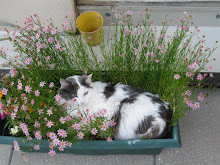I hate being stereotyped.
“She’s fat –she doesn’t care about good health.
She’s old so must be senile.
She
doesn’t work- she must be lazy, or uneducated.
And worst of all she’s a woman. They don’t count!
Recently
I have had a couple of stories brought to my attention by two
friends. The first felt slighted in church because her husband divorced her.
Friends still welcome her husband but she feels invisible.
The
second was following the directions given her in her calling in church, but
another member verbally attacked her, correcting her behavior. She became
fearful of him and won’t go to church anymore. Her minister left her feeling
like the other person’s feelings were more important because he was a powerful
man.
I was reading an old Ensign
magazine when I came across and article
Me? A Shepherd in
Israel?
By
Elder Daniel L. Johnson of the Seventy
“One of the practices that
distinguishes The Church of Jesus Christ of Latter-day Saints is that of having
lay shepherds. We have no paid clergy in the wards, branches, stakes, and
districts of the Church; rather, the members themselves minister to each other.
Every member of The Church of Jesus
Christ of Latter-day Saints has a calling to be a shepherd in Israel.
Member-shepherds serve in bishoprics and branch presidencies, as priesthood and
auxiliary leaders, as clerks and secretaries, as teachers of every
kind—including home and visiting teachers—and in countless other capacities.
Lay shepherds have several things in
common. Each has sheep to nourish, encourage, and serve. Each is called by the
Lord through His appointed servants. Each is accountable to the Lord for his or
her stewardship as a shepherd.”
“We are shepherds watching over Israel.
The hungry sheep look up, ready to be fed the bread of life. … Our task is to
reach out to those who, for whatever reason, are in need of our help.”
Two breeds of sheep came to my mind.
Shropshires are gentle in disposition. The ewes are
prolific and long-lived with wonderful mothering and milking abilities.
Their
adaptability to all kinds of pasture land, hardiness to withstand our variable
climate, close, oily wool to shield them from the snows and sleet, their
longevity and prolificacy and many other outstanding qualities made them widely
popular in the States
Merino, breed
of fine-wool sheep
originating in Spain. It was particularly well adapted to
semiarid climates and to nomadic pasturing. Many new breeds come from them.
As
shepherds do we just look after the Merinos and ignore the Shropshires?
Or
are we responsible for all breeds?
We
can relate this not to just the religious stories of finding the lost sheep but
also to the different religious and ethnic and economic backgrounds of those we
meet and work with.
In
one book I’m reading a woman was terrified of the Indians because she had heard
stories of savages in the old west.
In
our country there are many who fear Muslims because of the actions of some.
We
avoid the homeless and the mentally ill.
We
turn away from immigrants. We ignore the handicapped, and the poor.
So
I asked my cousin whose husband is both a sheepherder and a bishop if he was
able to treat his Shropshires and Merinos with equal love. She said they raised
Rambouillet/Suffolk sheep.
May we remember our responsibilities as
shepherds so that we can give a good accounting to the Lord regarding our
stewardship over the sheep He has assigned to each of us.



1 comment:
Photo by Debbie Paisner
Post a Comment